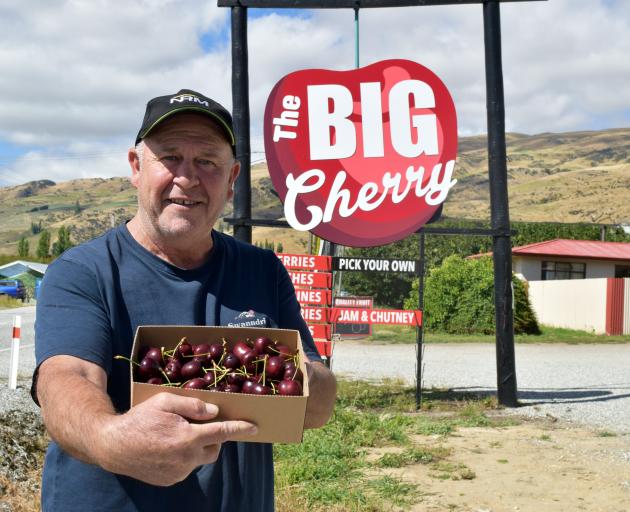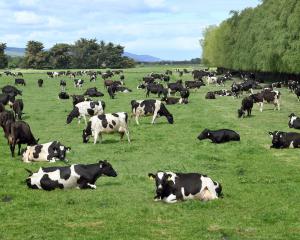
New Zealand cherry exports are forecast to grow 14% to $96 million this season. Shawn McAvinue talks to Teviot Valley orchardist Chris Toms about the impact of a brief absence of bees, an abundance of pickers and his love of growing cherries for people to eat all over the world.
The cherry season will go down as a good one despite a much smaller harvest, a Teviot Valley orchardist says.
All the cherries have been picked on The Big Cherry orchard in Coal Creek, north of Roxburgh.
Orchard owner Chris Toms said picking started the first week of December and finished late last month.
About 20 tonnes of cherries were picked from his nearly 4ha of trees.
Usually the harvest included up to 10 more tonnes.
"We were well down this season."
The reason for the smaller harvest was a week of cold weather that caused a lack of activity from honey bees during the peak time for pollination.
"The bees just don’t work."

The reason for the export price rise included a drop in supply from other international cherry producers, such as Chile and Australia.
"Tasmania was hit badly with rain."
The cherry export price was between $16 per kg and $20 per kg this season, compared to $8 per kg last season.
An oversupply of cherries on the international market last season reduced export prices and reduced demand for certain cherry sizes.
A grower lost money selling cherries for $8 per kg.
The cost to produce cherries was up to $9 per kg.
On the front page of Southern Rural Life in November 2021, Mr Tom was in his orchard under the headline "Less than cherry outlook" due to a picker shortage.
A reason for the staff shortage in 2021 was a lack of international backpackers in New Zealand because of Covid border restrictions.
Staff shortages were no longer an issue.
"We turned away 200 people this season — there are so many staff."
Six Spanish backpackers he employed to pick cherries this season left the orchard after securing jobs in another industry.
"I had them replaced in an hour."
The greater supply of workers this season had been fantastic because you could select the best staff, he said.
"You get much better quality staff, and our staff have been bloody fantastic."
Of the 20 pickers this season, about 75% were international backpackers, including Argentinians and Mexicans.
On the day Southern Rural Life visited The Big Cherry last week, Italian couple Stefano Bonalumi and Emma Glavich were picking plums.
Miss Glavich said they had working visas, and arrived in New Zealand in December last year.
They had never picked fruit before working on The Big Cherry, she said.
"It is our first job in New Zealand."
A friend in Italy had worked on The Big Cherry and recommended contacting Mr Toms.
They would finish on the orchard this week to travel across the South Island before travelling to the North Island to pick kiwifruit.
"It has been fun and everybody is super nice here," Miss Glavich said.
Picking crew manager Jackson Toms, Chris’ son, was the sixth generation to work on the orchard.
Jackson, 22, said this season was the most enjoyable of his time working on the orchard.
"Having a good crew makes it a lot more fun."
He was set to start a graduate job as an accountant in Dunedin in April, but expected to one day return to the orchard to work.
"It is such a good lifestyle — it is definitely on the cards — but I have to see how this new chapter goes first."
For now, he was following his parents’ advice to gain experiences outside the valley before he settles down.
Mr Toms said the staff this season had been great and the fruit had great flavour.
"It would have been nice to have picked another 10 tonne, but that’s how it is."
The Ministry for Primary Industries’ "Situation and Outlook for Primary Industries" report said favourable winds were blowing for cherry growers, as a later Chinese New Year was falling this Saturday.
"There will be a longer window for growers to make the most of the key markets who are a part of these celebrations and receive premium prices. This should ease some of the pressure that growers faced last season," the report said.
Mr Toms said he started cherry picking late and finished early, so none of the cherries he exported would be eaten at New Year celebrations in China.
"They’ll be all gone by now."
About 75% of his cherries were exported.
The countries he exported cherries to this season included Guam, Taiwan, Thailand and Vietnam.
"They go all over the world."
The ministry report states additional airline routes from Christchurch to China and Hong Kong during the cherry export season would also be favourable to Central Otago growers.
Mr Toms said two more China Airlines flights to Christchurch was beneficial for cherry exporters.
"More people coming in to New Zealand, there was more space going out. Freight this year was good and it came down in price a wee bit."
Freight was more expensive last season because there were fewer people travelling to New Zealand, he said.
"The price was horrendous."
Freight cost about $5 per kg last season compared to about $3.90 per kg this season, he said.
Cherry export revenue increased 8% to $84million in the year to June 30 last year, the report said.
Export volumes increased 14% to 3685 tonnes.
Cherry exports were forecast to grow 14% to $96million in the year to June 30 this year.
The cherry season was a busy time; the small fruit was picked between 6am-8pm, seven days a week, Mr Toms said.
"About 100 hours a week, but you do it because you love it."














